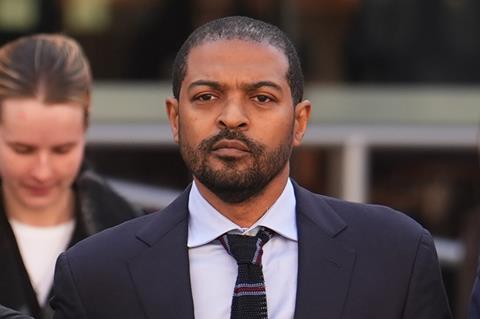
UK actor-director-producer Noel Clarke has lost his libel claim against The Guardian newspaper.
In the conclusion to a 224-page judgment, Justice Steyn wrote, “The Guardian has succeeded in establishing both truth and public interest defences to the libel claim.”
“We welcome the decision of the High Court today,” said Guardian News and Media editor-in-chief Katharine Viner in a statement. “The judge ruled, in extremely clear language, that The Guardian’s reporting was substantially true, and our belief that the reporting was in the public interest was undoubtedly reasonable.
“This judgment is a deserved victory for those women who suffered because of the behaviour of Noel Clarke. Going to court is difficult and stressful, yet more than 20 women agreed to testify in the High Court, refusing to be bullied or intimidated.
“This is also a landmark judgment for Guardian journalism, and for investigative journalism in Britain. It was important to fight this case. This was a deeply-researched investigation by some of the Guardian’s best reporters, who worked diligently and responsibly. The judgment is clear that our investigation was thorough and fair, a template for public interest journalism.
“I hope today will give encouragement to other women in similar situations who have been too fearful to raise their voices for fear of the consequences.”
The decision was announced following the five-week trial at London’s Royal Courts of Justice in spring this year. Following the judgement, The Guardian press office said, “The Court has adjourned consideration of any arguments. A consequentials hearing will be held on 23 September 2025, at which issues such as liability of costs will be determined by the Court.”
Clarke sued Guardian News and Media (GNM) over seven articles and a podcast, including an April 2021 article that said 20 women who knew him professionally had made allegations of sexual misconduct and bullying.
Clarke denied the allegations, while GNM defended its reporting as being true and in the public interest.
The judgment contains 1,023 separate points by Justice Steyn. In point 191, she states, “I have not found Mr Clarke to be a truthful witness.”
Justice Steyn went on to say: “One aspect of Clarke’s evidence that I accept is his belief that is he not what The Guardian ‘branded’ him. Although I find that he has been untruthful about most of the allegations, in his efforts to salvage his career, his initial response that ‘some of my actions may have affected people in ways I did not intend of realise’ was true. Even when his actions have been calculated and deliberate, Mr Clarke has tended to be oblivious to their impact, regarding his own behaviour as being ‘naughty’, ‘cheeky’, ‘teasing’ or within his rights as a director or producer. In addition, he does not see himself reflected in the Articles because there is a kinder, more generous side to him. But that does not detract from the conclusions I have reached.”
In a statement following the judgment, Clarke described the decision as “disappointing”.
He thanked his family “who never stopped believing there was something worth fighting for” and his team “who stood beside me throughout”, according the PA Media.
“For almost five years, I have fought against a powerful media outlet and its extensive legal teams over inaccurate and damaging reporting. These stories started via anonymous emails portraying me as a monster to attract attention and outrage. The goal was to damage my career, and they succeeded,” said Clarke in the statement.
“I have never claimed to be perfect. But I am not the person described in these articles. Overnight I lost everything, the media outlet didn’t just ruin my life; they ripped through my family’s also.”
During the trial, the court heard from Clarke and witnesses for him, including his wife and actress Louise Dylan, and from over 30 witnesses in support of The Guardian’s reporting. The latter included 26 people who say they were victims of or witnesses to serious misconduct by the actor, or can corroborate the allegations against him.
Allegations against Clarke included that he had shared nude photographs of women without their consent, groped them, and asked them to look at him when he was exposed.
Clarke wrote and starred in 2006 crime drama Kidulthood, then wrote, directed and starred in sequels Adulthood and Brotherhood. He won the Bafta rising star award in 2009; he was awarded the Bafta outstanding British contribution to cinema award in 2021, with the award suspended later that year following the allegations against him.

























No comments yet